Adults with learning disabilities will all be offered Covid vaccines as part of the top six priority groups, Britain’s health chiefs said today after a campaign by Jo Whiley to get her sister jabbed.
The JCVI, which decides on who gets the life-saving jabs first, said people with learning disabilities of any kind should be bumped up the pecking order.
They will be added into priority group six, which includes all adults with a long-term health condition that puts them at higher risk of severe illness.
BBC radio DJ Jo Whiley called for people with learning disabilities to get vaccines sooner after her 53-year-old sister, Frances, who has a developmental disorder and lives in residential care, was hospitalised with Covid-19 this month.
Whiley praised today’s policy change as ‘absolutely crucial’ and said she was ‘delighted’. She said Frances is now back at home and is ‘doing great’.
Vaccinations in group six are next in line and they take higher priority than people aged between 50 and 64, who make up groups seven, eight and nine.
Anyone who is on the GP Learning Disability Register will be eligible for a vaccine earlier than planned, the JCVI said, regardless of how severe their disability is. People with profound disabilities were already in group six but it will now include milder conditions, officials said, because the register may not differentiate between them.
This register is open to anyone with a diagnosed learning disability. These include autism and Asperger’s, William’s syndrome, global developmental delay and cerebral palsy.
People with Down’s syndrome were already in the clinically extremely vulnerable group so part of the population targeted with vaccines by February 15.
Public Health England said at least 150,000 people would now get a vaccine sooner than expected in order to ‘prevent as many deaths as possible’.
The charity Mencap says there are 1.5million people with learning disabilities in the UK, however, and officials did not say why the number expected to benefit from the policy change is so much lower. Some people may not be on the GP register, while others are already in high priority groups. Mencap is now urging everyone with a learning disability to check they are on the register.
The Office for National Statistics revealed in a report this month that people with learning disabilities had an almost four times higher chance of dying if they developed Covid-19, compared to people without the difficulties.
Britain has one of the most accelerated Covid vaccination programmes in the world and has already immunised 17.9million people with at least one dose of a vaccine.
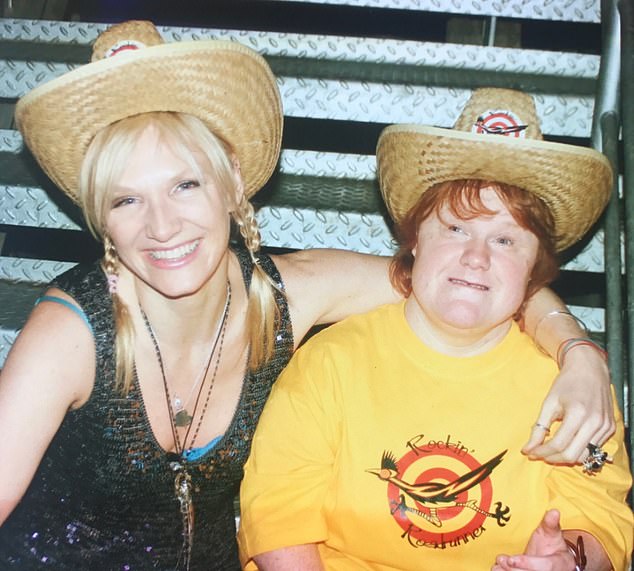
Jo Whiley, pictured with her sister Frances who has a learning disability and was hospitalised with Covid-19 this month, heralded today’s policy changed as ‘delightful’ news

All adults on the GP Learning Disability Register will be added into priority group six if they are not included in one of the higher priority sections of the list
Professor Wei Shen Lim, Covid chief at the Joint Committee on Vaccination and Immunisation, said: ‘The JCVI’s advice on Covid vaccine prioritisation was developed with the aim of preventing as many deaths as possible.
‘People who are severely affected by learning disabilities are at higher risk of death from Covid-19.
‘As the severity of any disability may not be well recorded in GP systems, JCVI supports the NHS operational plan for anyone on the GP Learning Disability Register to be invited now for vaccination as part of priority group six, and to reach out in the community to identify others also severely affected by a learning disability but who may not yet be registered.’
JO WHILEY PRAISES VACCINE CHANGE AS LEARNING-DISABLED SISTER DISCHARGED FROM HOSPITAL AFTER COVID BATTLE
BBC radio DJ Jo Whiley, whose sister Frances has a learning disability and was hospitalised with Covid-19 this month, said she was ‘delighted’ at today’s news.
Whiley, 55, highlighted the gap in the rollout when she said she had been offered a vaccine before her sister, despite not being in a high risk group.
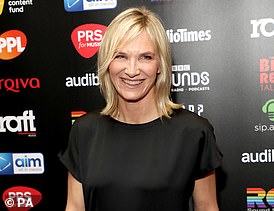
Jo Whiley
And Frances, who is 53 and lives in residential care because of her developmental delay, became seriously ill with Covid-19.
Whiley said the family had discussed end-of-life care for Frances last week but that her sister had now been discharged from hospital.
She told the BBC today: ‘This is a great day – I am so relieved. I’m so happy for all those people who’ve been living in fear.
‘I’m very grateful to the Government for listening, because it’s a very complicated situation and it’s very difficult to categorise people according to their disability, it’s very, very tricky and that’s become apparent I think over the past few months.
‘And so this is clear, this encompasses everybody, and all those people who have been feeling very neglected, feeling like they don’t matter, that we don’t care, now know that we will be protecting them.
‘This is absolutely crucial and I could not be more delighted. This is a massive step forward.’
Advertisement
Until now, many people with learning disabilities other than Down’s syndrome had not been included on the vaccination priority list.
They would have been incorporated in the ‘clinically extremely vulnerable’ shielding group if they had other physical health problems, regardless of their learning disability, but may not have got priority access if they were otherwise healthy.
Jo Whiley, 55, highlighted the gap in the rollout when she said she had been offered a vaccine before her sister, despite not being in a high risk group.
And Frances, who is 53 and lives in residential care because of a developmental delay caused by Cri-du-Chat syndrome, became seriously ill with Covid-19 and was hospitalised earlier this month.
Whiley said the family had discussed end-of-life care for Frances last week and feared she might die, but that her sister was discharged from hospital on Tuesday.
She told the BBC today: ‘This is a great day – I am so relieved. I’m so happy for all those people who’ve been living in fear.
‘I’m very grateful to the Government for listening, because it’s a very complicated situation and it’s very difficult to categorise people according to their disability, it’s very, very tricky and that’s become apparent I think over the past few months.
‘And so this is clear, this encompasses everybody, and all those people who have been feeling very neglected, feeling like they don’t matter, that we don’t care, now know that we will be protecting them.
‘This is absolutely crucial and I could not be more delighted. This is a massive step forward.’
Speaking about her sister, she added: ‘This is the first step in her recovery, it’s going to be hard work from here on in, but she’s doing great.’
Revealing that Frances had been discharged from hospital yesterday after a brush with severe Covid, Whiley posted a video of her sister on Twitter and said: ‘First of all, Frances would like to say a huge thank you to everybody who has helped her, especially the amazing doctors and nurses of the NHS, and her many MANY well-wishers.
‘It’s hard to believe we’ve gone from discussing palliative care on Friday night to sitting on her favorite bench drinking cups of tea. It doesn’t end here though. Any LD carer will know have someone with demanding needs relying on you to keep them alive 24/7.
‘I hope the vaccine is reaching more and more of those with learning disabilities. Not everyone has been as lucky as us. So many have died or are suffering from long Covid because they were simply not protected. We need to show them that they are not forgotten and we care.
‘Covid has brought with it further complications. We’re now dealing with worrying diabetes and high blood pressure issues and my parents are exhausted beyond belief. It’s so hard observing from behind a visor and mask, helpless doesn’t cover it.’
ONS data in a report this month revealed that people with learning disabilities are more likely to die of Covid-19 than people without the disabilities.
It found that around six per cent of people who died of Covid-19 up to November 2020 – 2,955 people out of a total 50,888 in England.
But they only made up 1.2 per cent of people in the study, meaning they were disproportionately more likely to die.
Living in care homes or having other health conditions made people more likely to die of coronavirus, the statisticians found.
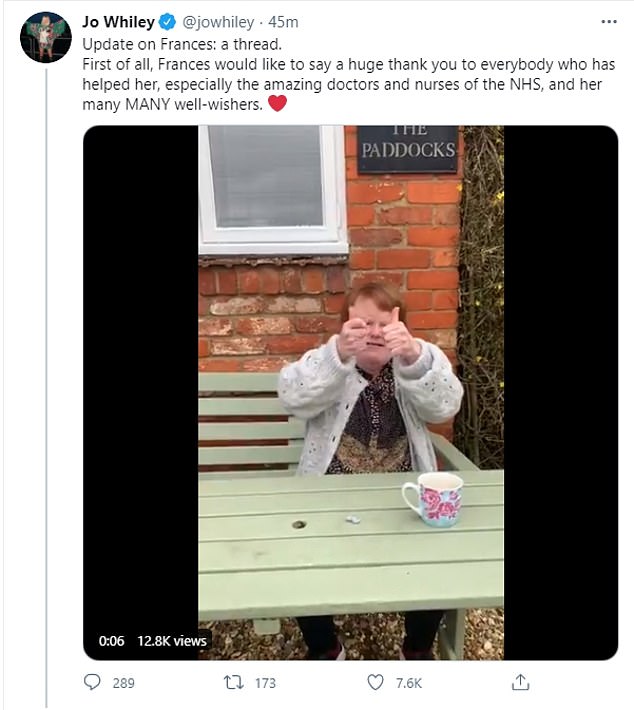
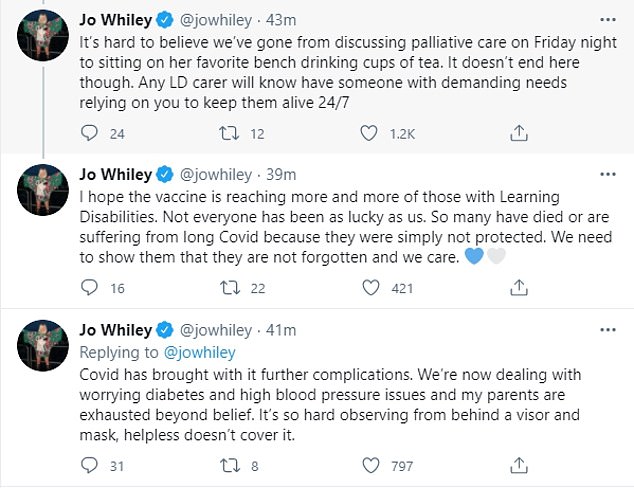
Jo Whiley revealed that her sister Frances had been discharged from hospital after Covid-19
The report said: ‘Looking at people with a medically diagnosed learning disability, the risk of death involving Covid-19 was 3.7 times greater for both men and women compared with people who did not have a learning disability.
‘After using statistical models to adjust for a range of factors, a raised risk of 1.7 times remained unexplained for both sexes.’
As part of the JCVI’s new drive to get jabs to learning disabled adults, the NHS will also offer the vaccines to adults living in residential or nursing care, as well as those in shared accommodation for people with disabilities.
And doctors will do community outreach to find learning disabled people who aren’t on the GP register but may still be at risk.
The Government’s care minister, Helen Whately, said: ‘I have heard first-hand how tough this pandemic has been for people with learning disabilities and their families.
‘We are determined those more at risk from Covid should be vaccinated as soon as possible.
‘Following the JCVI’s updated advice and to make this process simpler and faster, we will be inviting everyone for vaccination who is on their GP’s learning disability register.
‘This will mean those who are at a higher risk from the virus can get the protection they need.’
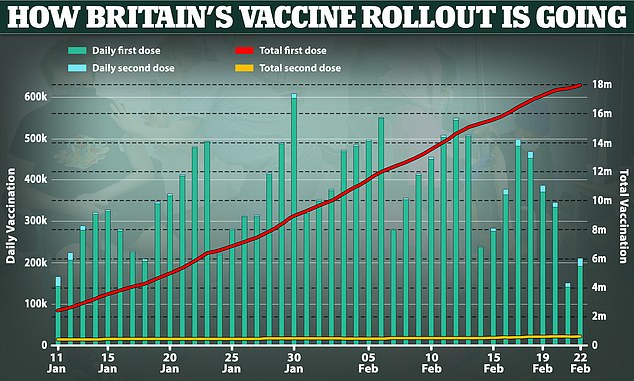
Britain has one of the most accelerated Covid vaccination programmes in the world and has already immunised 17.9million people with at least one dose of a vaccine.
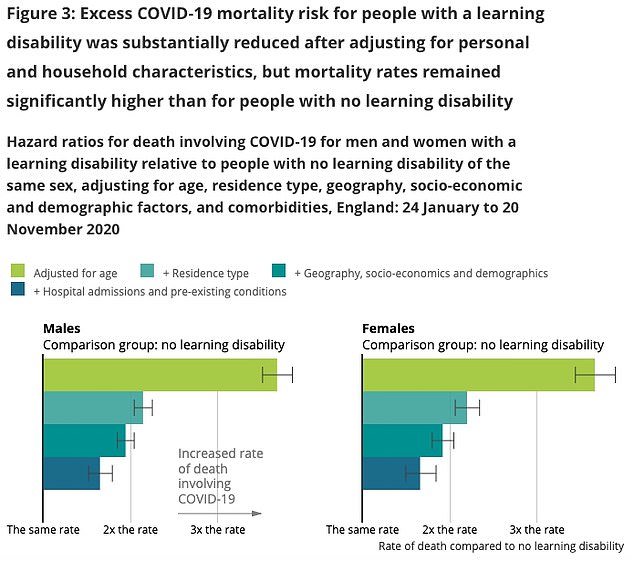
Office for National Statistics data showed the risk of death involving Covid-19 was 3.7 times greater for both men and women with learning disabilities compared with people who did not have a learning disability
Mencap, a major learning disability charity in the UK, welcomed the announcement.
Jackie O’Sullivan, its executive director of advocacy, said: ‘This is fantastic news for people with a learning disability.
‘Now everyone on the GP Learning Disability Register can get access to the Covid vaccine.
‘It’s now crucially important that everyone with a learning disability checks that they are on the register and asks to go on it if they are not.
‘Being on the register has many benefits and entitles people to annual health checks and prioritisation for future vaccinations, as well as allowing them to get the Covid vaccine and be confident they are protected.’
Source link : https://www.dailymail.co.uk/news/article-9294463/Coronavirus-Adults-learning-disabilities-bumped-UKs-Covid-vaccine-priority-list.html











